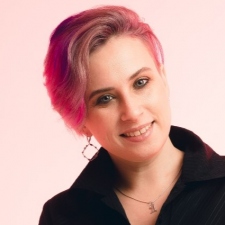Here at PocketGamer.biz we celebrate diversity of all kinds. Speaking to various inspiring women at our Pocket Gamer Connects events around the world, and being aware that there is still a real need to shout about the subject, we decided to focus on females for December. In this series of features we will interview various women working in gaming, as well as sharing other stories around the subject.
We spoke to Gameram Chief Community Manager Darya Steel about her work bringing gamers and game makers closer together than ever before, and the unique challegnes faced by women in the games industry.
Please tell us a little bit about yourself and your current role?
I am the Chief Community Manager at Gameram — a new social network for people who love games to connect over their mutual passion. Headquartered in Cyprus, Gameram prides itself on creating a welcoming space for mobile gamers to openly share their passion and accomplishments with likeminded people.I am responsible for creating the users overall experience, and help supporting and building our community.
What first attracted you to the gaming industry?
About 10 years ago, I didn't even think that I would ever work in the gaming industry. I just enjoyed playing my favourite games, and helped moderate in-game chat and hold contests. One day I found out that there was a vacancy for a community manager in the project that I was interested in and decided to apply. From there, I got the job and started to build my dream career!
What effect do you think the culture within which you grew up has had an influence on your career path?
Games have always been encouraged in my family. Since childhood, I have played games with my father - we used to play on a Sega console together. Later, when we had a PC at home, my parents only partially controlled my hobby. In fact, they always guided me rather than forcing anything down. I have never been judged for my choice of profession or professional field.
When I was at University, there were no special courses at the time which helped you enter into the games industry, or community management. This was one of the reasons why I began to look for ways to teach myself, and then teach community management to other people. That has even resulted in me publishing my own book, The Power of Communities, this year.
What challenges have you had to face during your career - thinking specifically about being a female in the industry?
I am lucky that I have never faced discrimination against women in the industry on my own career path. However, I know there can be challenges, making it more difficult for women to climb the ladder in the games industry due to bias.
As for the players in games… Sadly there have been a lot of situations regarding communication with players that have made me uncomfortable as a female. There have been instances where my social profiles have been searched, I have received explicit messages, I have been offered obscene things, and I have received abuse and been accused of being incompetent. I believe it is definitely more toxic to be a woman in games, and this is something that needs to be addressed and taken seriously.
What advice would you give to companies looking to improve equality within the workplace?
We need to provide women with the opportunity to express themselves openly, and to work in all professions. For example, I think that it is more difficult for women to find their place in technical professions. But also, we need to protect women in the face of both colleagues and users.
In my experience, there have been cases when a community manager needs to justify the reasons for their decisions to top management. A community manager is a bridge between a company and users, and it is important to be sympathetic to what they report to users on behalf of the company and to pay attention to whether this puts your employee at risk.
And what advice would you give to other women joining the industry?
Game development can be a very changeable and stressful field. There are lots of different types of games and players, a lot of genres and platforms. Only a small percentage of games are successfully released and make a profit. That means that in most cases, you have to constantly test new projects and deal with a toxic audience that is often dissatisfied with changes. But I’m sure that if you want to work with games, you should love them.
Who inspires you the most (not necessarily from within games)?
There are so many inspirational people out there, here are just a few.
Richard Millington, founder of Feverbee — he wrote great books about community management.
Victoria Tran, Community Director at Innersloth, creators of Among Us. They do great things with gamers.
P!nk — she is my favourite singer and just an amazing woman in general.
Since you entered the games industry, what is the biggest change you’ve seen and is this for better or worse?
Game development has become a more serious and mature industry. A lot of people who thought that games are just a hobby for children, recognised that games is a very promising and monetised industry. So now we have a lot of new professions and even education available.
The second big change is due to the growth of the smartphone market. When I entered the industry 10 years ago, it was impossible to predict this huge mobile games market because everyone around me was playing on a PC. There are now 2.6 billion people playing mobile games! This is why we began Gameram as a mobile application — we believe that players need their own social network.
If you could change one thing about the industry, what would it be and why?
I would like game developers to take more care of their users and the atmosphere in their gaming community. Yes, games are a business. But this is a business of such a scale, in which we can influence the future of children. Let's promote ethical communication, politeness and mutual respect among them through soft rules and guiding communication in games that occupy such a large part of their lives.
If you could only keep 3 games on your phone for the rest of time, which would you choose?
It’s hard to choose only three! But I would say Genshin Impact, Pixel Dungeon and Dead Cells.






















